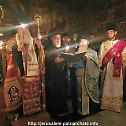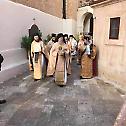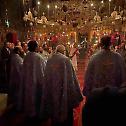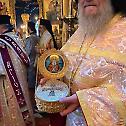The Feast of Holy father Savvas The Sanctified
On Friday, December 5/18, 2020, the Patriarchate celebrated the feast of our Holy Father Savvas the Sanctified at his Holy Monastery in the Judea desert, by the bank of brook Cedron, which leads to the Dead Sea.
This old and respectable Monastery was founded by Saint Savvas himself, in A.D. 500. Saint Savvas came to the Holy Land from his hometown Moutalaski of Cappadocia at the age of 18, became a novice under the obedience of Saint Euthymius the Great and his co-ascetic Saint Theoktistos, and later on founded the Lavra that bears his name.
He founded the Monastery as a Lavra community, for advanced Monks who had already received their training in a Coenobitic Monastery. Saint Savvas founded another ten Monasteries around Palestine and became a great spiritual father in all of them, leader of thousands of Monks and laity and at the same time fervent and brave supporter, along with Saint Theodosios the Cenobiarch, of the decisions of the 4th Ecumenical Synod of Chalcedon in A.D. 451, which established the two Natures of our Lord Jesus Christ, the divine and the human, in one Hypostasis.
In this historic Monastery, the commemoration of Saint Savvas was celebrated with a contrite All-night Vigil, officiated by H.H.B. our Father and Patriarch of Jerusalem Theophilos, with co-celebrants the Archbishop of the three-day celebrations, His Eminence Aristovoulos of Madaba, and their Eminences; Metropolitan Kyriakos of Nazareth, Archbishop Aristarchos of Constantina, and Metropolitan Joachim of Helenoupolis. The chanting was delivered by Archbishop Aristovoulos on the right in Greek, and by Archimandrite Philotheos with his helpers on the left in Arabic. The service was attended by Monks and Arab-speaking faithful from Bethlehem, Beit Jala and Beit Sahour.
Before the Holy Communion, His Beatitude delivered the following Sermon:
“The works of the Lord are great, sought out of all them that have pleasure therein. The works of his hands are verity and judgment; all his commandments are sure. They stand fast forever and ever and are done in truth and uprightness” (Psalm 111:2, 7-8).
Beloved Brethren in Christ, Fathers and Brothers,
Noble Christians
The desert rejoices today and the area of the River Jordan is exceeding glad, on the commemoration of Saint Savvas the Sanctified in his Lavra. And this is so because our Holy Father Savvas became “a peer of angelkind, dweller with saints in the heights, companion of the prophets and joint-heir with the apostles and martyrs” (Great Vespers, sticheron 1).
The incorrupt and fragrant relics of God-bearing Savvas that we see before us, is a testimony and a true witness that he became a vessel of the gifts of the Holy Spirit, of Christ’s Spirit. For while he was still a man of clay, he put on Christ, becoming Light of Christ, and having received by God the power to work miracles, he was able to convince those who lived in ascesis with him, to despise the worldly goods and the carnal passions, as his hymnographer says: “Righteous Father, diligently struggling in virtue from thy childhood, thou becamest an instrument of the Holy Spirit, and receiving from Him the power to work miracles, thou didst persuade men to disdain pleasures. And now, as thou art more purely illuminated by the Divine Light, do thou enlighten our minds also, O Savvas our Father” (Entreaty, Troparion 3).
Having been illumined by the Lord’s Light, Saint Savvas did not doubt in the least that the Lord’s works are truth, judgment and righteousness because the Lord is reliable, true in His words and His words are just. Interpreting David’s words: “all His commandments are sure” (Psalm 111:7), Saint Chrysostom says: “what is the meaning of the word ‘sure’; that they are certain, and they endure. And if they are bridged, then punishments follow, and these commandments are not shaken; and even if men disobey, God Himself makes justice”.
For God’s commandments cannot be shaken, because “They stand fast forever and ever, and are done in truth and uprightness” (Psalm 111:7), and this is confirmed by Jesus’ prayer for His Disciples “Father, sanctify them through thy truth: thy word is truth. As thou hast sent me into the world, even so, have I also sent them into the world. And for their sakes, I sanctify myself, that they also might be sanctified through the truth” (John 17:17-19).
Interpreting these words of the Lord, Saint Cyril of Alexandria says: “Jesus became an Apostle and a High Priest of our confession, according to Paul’s voice (Hebrews 3:1), as it is befitting to the human form and the manner of His kenosis; as soon as the Holy Apostles were elected, they had to be sanctified by the Holy Father, implanting in them the Holy Spirit through His Son.”
Our Father Savvas can be considered “a remnant according to the election of grace” (Romans 11:5), as we can see from his reply to Saint Euthymius the Great; “I know, Holy Father, that God who foresees everything, has led me to your holy hands in order to save me.” Then, Great Euthymius sent him to Theoktistos, asking the latter to take care of Savvas, as he was going to become great in monasticism by the grace of Christ”.
In other words, my dear Brethren, blessed Savvas received the sanctification from God the Father since his early childhood, through the dwelling of the Holy Spirit in him, through our Saviour Jesus Christ. Behold, therefore, why our Holy Father Savvas is called ‘sanctified’. He “purged himself from these… [and became] a vessel unto honour, sanctified, and meet for the master’s use, and prepared unto every good work” (2 Timothy 2:21).
The sanctified Saint by our Master and God is honoured by the Church of Jerusalem today, and let us say along with the hymnographer: “O Blessed Savvas, thou wast offered from thine infancy through thy great virtue as a pure and spotless sacrifice unto God, Who ere thy birth, verily foreknew thee; wherefore thou wast an adornment of the righteous Saints, an all-praised founder of cities in the wilderness. Hence, I cry to thee: Rejoice, O Father of great renown” (Kontakion).
It is precisely to this cause, our Holy Father Savvas, has called us, namely, to the participation in the grace of the Holy Spirit’s sanctification of his, through the intercessions of our Most-Blessed Lady Theotokos and Ever-Virgin Mary, who bore in the flesh the Saviour and Redeemer, the God of all and our Lord, in the Cave of Bethlehem; may we be granted to celebrate His Nativity in peace and health of body and soul. Amen. Many happy returns!”
Immediately after the Dismissal of the Divine Liturgy, a monastic meal followed.
Leaving the Monastery, His Beatitude blessed the Fathers and having accepted their thanks, He stopped over the Monastery of Saint Theodosios the Cenobiarch, according to the custom, before His return to Jerusalem and the Patriarchate Headquarters.
In honour of Saint Savvas, the Divine Liturgy was also celebrated at his chapel inside the Holy Monastery of the Archangels, by the Master of Ceremonies of the Patriarchate, Archimandrite Bartholomew, at the invitation of His Eminence Archbishop Demetrios of Lydda.
Source: jerusalem-patriarchate.info










